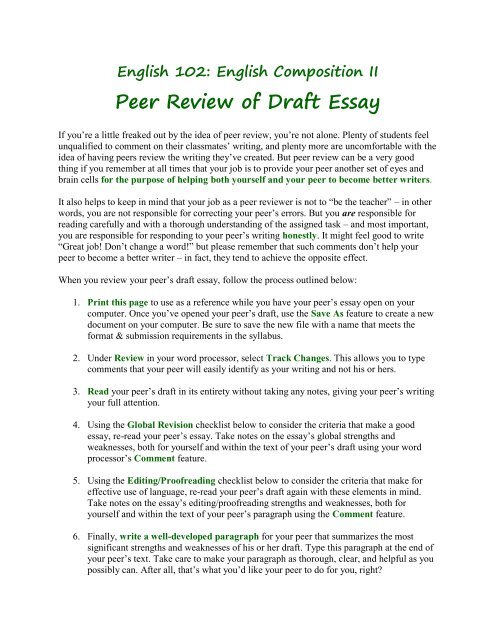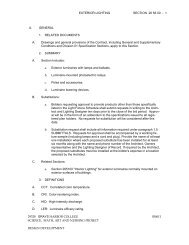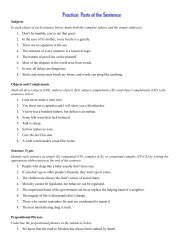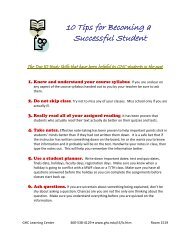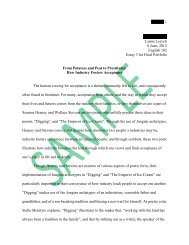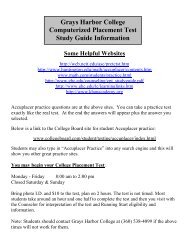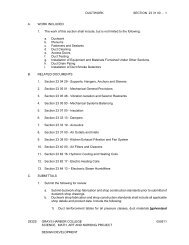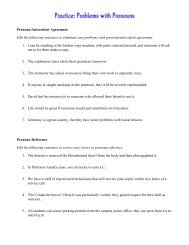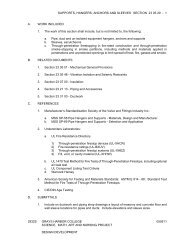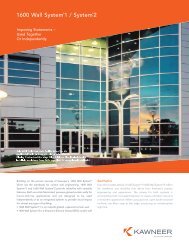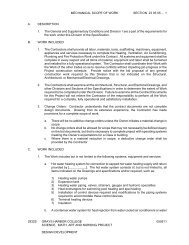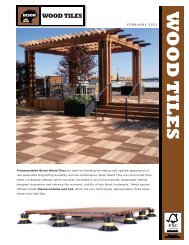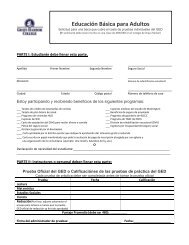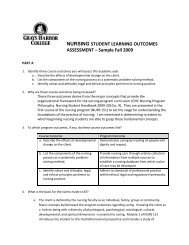Peer Review Assignment
Peer Review Assignment
Peer Review Assignment
Create successful ePaper yourself
Turn your PDF publications into a flip-book with our unique Google optimized e-Paper software.
English 102: English Composition II<br />
<strong>Peer</strong> <strong>Review</strong> of Draft Essay<br />
If you’re a little freaked out by the idea of peer review, you’re not alone. Plenty of students feel<br />
unqualified to comment on their classmates’ writing, and plenty more are uncomfortable with the<br />
idea of having peers review the writing they’ve created. But peer review can be a very good<br />
thing if you remember at all times that your job is to provide your peer another set of eyes and<br />
brain cells for the purpose of helping both yourself and your peer to become better writers.<br />
It also helps to keep in mind that your job as a peer reviewer is not to “be the teacher” – in other<br />
words, you are not responsible for correcting your peer’s errors. But you are responsible for<br />
reading carefully and with a thorough understanding of the assigned task – and most important,<br />
you are responsible for responding to your peer’s writing honestly. It might feel good to write<br />
“Great job! Don’t change a word!” but please remember that such comments don’t help your<br />
peer to become a better writer – in fact, they tend to achieve the opposite effect.<br />
When you review your peer’s draft essay, follow the process outlined below:<br />
1. Print this page to use as a reference while you have your peer’s essay open on your<br />
computer. Once you’ve opened your peer’s draft, use the Save As feature to create a new<br />
document on your computer. Be sure to save the new file with a name that meets the<br />
format & submission requirements in the syllabus.<br />
2. Under <strong>Review</strong> in your word processor, select Track Changes. This allows you to type<br />
comments that your peer will easily identify as your writing and not his or hers.<br />
3. Read your peer’s draft in its entirety without taking any notes, giving your peer’s writing<br />
your full attention.<br />
4. Using the Global Revision checklist below to consider the criteria that make a good<br />
essay, re-read your peer’s essay. Take notes on the essay’s global strengths and<br />
weaknesses, both for yourself and within the text of your peer’s draft using your word<br />
processor’s Comment feature.<br />
5. Using the Editing/Proofreading checklist below to consider the criteria that make for<br />
effective use of language, re-read your peer’s draft again with these elements in mind.<br />
Take notes on the essay’s editing/proofreading strengths and weaknesses, both for<br />
yourself and within the text of your peer’s paragraph using the Comment feature.<br />
6. Finally, write a well-developed paragraph for your peer that summarizes the most<br />
significant strengths and weaknesses of his or her draft. Type this paragraph at the end of<br />
your peer’s text. Take care to make your paragraph as thorough, clear, and helpful as you<br />
possibly can. After all, that’s what you’d like your peer to do for you, right
Global Revision Checklist<br />
<strong>Review</strong> the essay’s title as well as its<br />
introduction and conclusion. Think about the<br />
relationships among these three components. Do<br />
they match or do they disagree Make note of<br />
strengths and weaknesses in these crucial areas.<br />
Find the essay’s thesis. Is it clear Is it well<br />
positioned Does it meet all facets of the<br />
assignment <strong>Review</strong> the written assignment to<br />
ensure that your peer’s thesis is on target. Make<br />
note of strengths and weaknesses.<br />
Identify the topic sentence of each paragraph.<br />
Do they all relate to the thesis Are they all<br />
arguable, interpretive claims Make note of<br />
strengths and weaknesses.<br />
Identify the specific evidence from the primary<br />
source(s) used to support each claim. Is the<br />
evidence well chosen Is it well integrated Is it<br />
interpreted and analyzed Make note of strengths<br />
and weaknesses.<br />
Observe the essay’s development of analytical<br />
paragraphs. Does each paragraph involve<br />
claim, context, evidence, analysis, commentary/<br />
synthesis How might your peer improve the<br />
development of analytical paragraphs<br />
Identify specific uses of expert opinion. Are<br />
these uses appropriate to the argument Are they<br />
well chosen Are they interpreted and<br />
commented upon Make note of strengths and<br />
weaknesses.<br />
Think carefully about the assumptions your peer<br />
is making about how evidence relates to claim,<br />
about what readers need or value, or about the<br />
qualification/authority of sources. Are any of<br />
these warrants problematic In other words,<br />
does your peer expect the evidence to “speak for<br />
itself” If so, this is a problem! Make note of<br />
strengths and weaknesses.<br />
Editing/Proofreading Checklist<br />
Identify the writer’s transitions: words,<br />
phrases and sentences that link ideas together<br />
in the essay. Are they consistently effective<br />
in creating a coherent argument Make note<br />
of strengths or weaknesses in this area.<br />
Are sentence structures correct and<br />
effective, or are there fragments, comma<br />
splices and fused sentences<br />
Is grammar used effectively, or are there<br />
errors in such issues as subject/verb<br />
agreement, part of speech, pronoun case,<br />
etc.<br />
Examine the essay’s diction: Are words used<br />
correctly and effectively, or are there<br />
examples of words that have been misused or<br />
are not thoroughly understood<br />
Examine the citation of quoted or<br />
paraphrased textual evidence. Is it ethically<br />
and accurately cited according to MLA<br />
citation style Make note of strengths and<br />
weaknesses in this area<br />
Are words consistently spelled correctly Is<br />
the punctuation clear and effective Is the<br />
essay free of distracting typos and other<br />
mechanical errors<br />
Does the essay follow the assigned format<br />
completely and accurately


